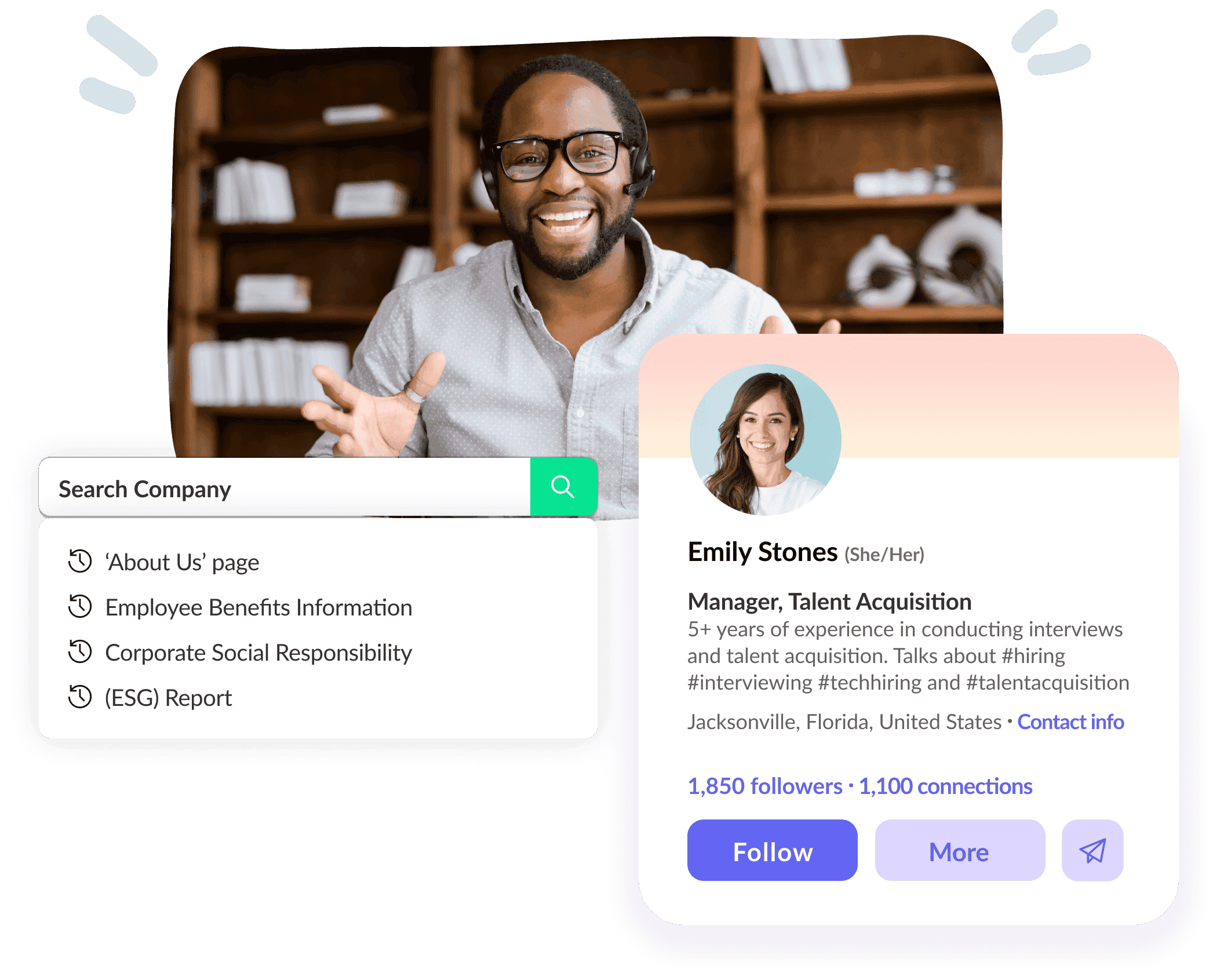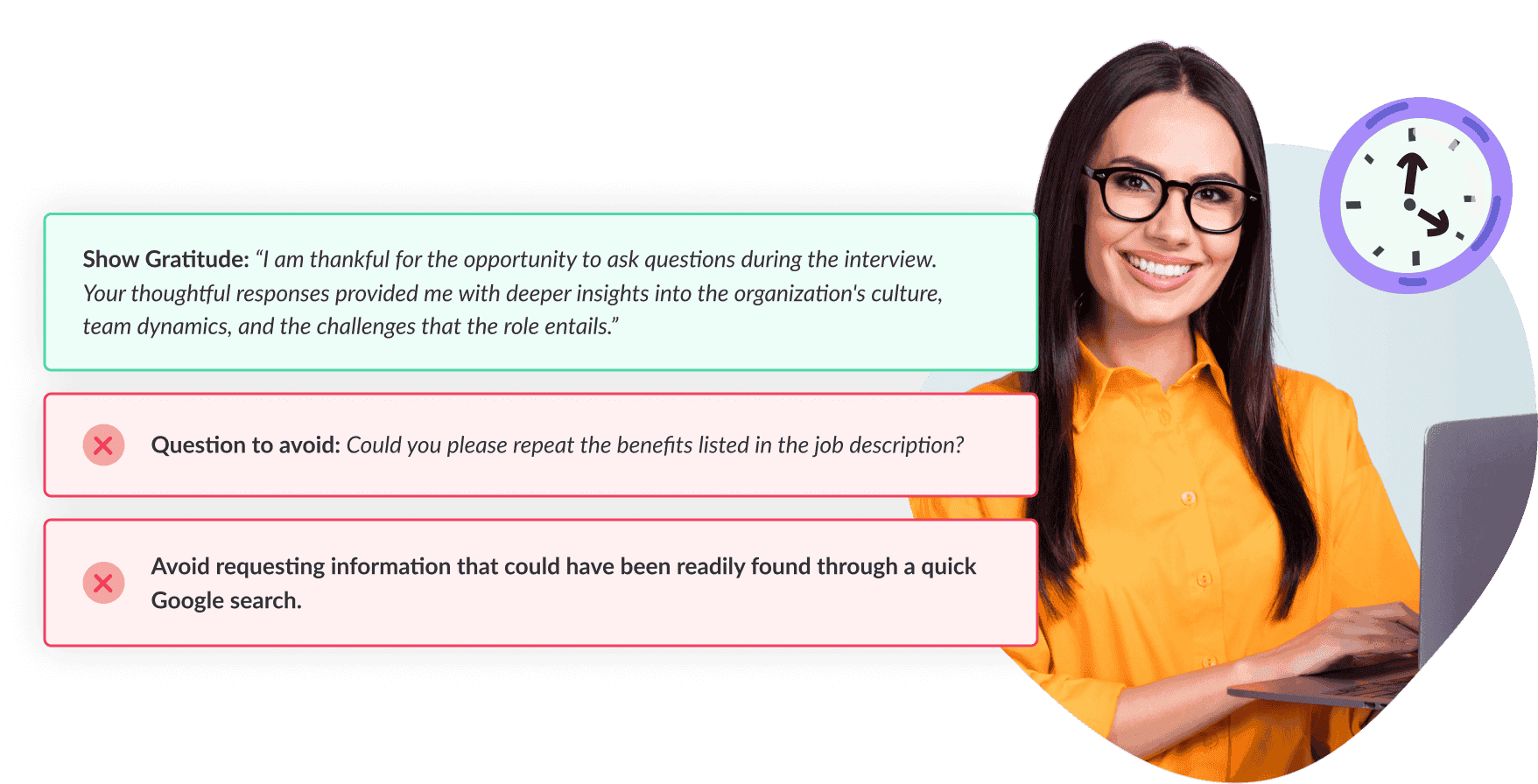
How to Resign From a Job Professionally
Explore key steps to resign from your position while maintaining positive relationships.

You may not be able to read the hiring manager’s mind during an interview, but you can ask the right questions. The best interview questions to ask will depend on the type of job you’re interviewing for. Since you only have a limited amount of time, it’s important to think carefully about what you can ask that will make the best impression.
Writing a resume, cover letter, and job application is an understandably challenging part of the job search process. And yet, a job interview is where most people experience their highest stress levels. In fact, a JDP survey found that job interviews are the second-most feared activity people engage in, only next to public speaking.
Interview nerves could come down to the fear of being unable to answer difficult questions. Hiring managers are usually a lot more forgiving on that end than you’d expect. What they’re less likely to forgive is what you ask after they say, “do you have any questions for me?”
When you don’t ask questions, hiring managers may assume you aren’t prepared. The same goes if you only ask very surface-level or inappropriate questions.
Before you prepare what you’ll ask in an interview, start with these steps.

Research different aspects of the company that will impact your role and your experience as an employee. Check out the company’s ‘About Us’ page, publicly-available employee benefits information, corporate social responsibility statements, and, if available, the most recent Environmental, Social, and Governance (ESG) report.
Google the person (or people) who will be conducting your interview. Get to know their role in the company, whether or not you’ll be working directly with them, and in what capacity. Asking about their personal experience with the company and more about what their day-to-day looks like can be a good practice.
The job description is one of the most important things to consider as you think about questions to ask. There may be information that isn’t very descriptive, providing an excellent launching point for clarification questions.
Think about and list your personal and professional goals. Use them to choose questions to help you better understand whether the company will help you achieve those goals.
Once you better understand the company, the interviewers, the job, and yourself, you’ll choose questions more confidently.
Here are some interview questions to ask an employer divided by intention. In the name of being prepared, pick a few questions from each category, and don’t be afraid to pick more than you think you’ll have a chance to ask.

Use a question from this list if you didn’t understand something from the job description or interview.
Here are some clarification questions you can use directly or modify as needed:
Can you explain “X” a little bit more?
(Note: It’s a good practice to be specific about what “that” is here)
I’m not sure I understand what you mean/meant by “X.” Can you clarify?
Can you give me an example of what you mean by “X”?
Can you clarify the difference between “X” and “Y”?
The job description can only tell you so much. Come prepared with some role-specific questions to ask your interviewer.
Here are some questions to ask that will expand on your role in the company:
What are some professional development opportunities in this role?
What challenges might I face while working in this role?
Which of the required skills listed for this role will I use most?
What are some growth opportunities I’ll have while working in this role?
In what ways will I be able to collaborate with others in this role?
Will this role change or evolve in the future?
How are those working in this role evaluated?
Who will I report to while working in this role?
Will I have the opportunity to take on stretch assignments in this role?
Does this role include any leadership development opportunities or chances to showcase my skills to existing leaders?
The job description likely touched on employee benefits. If you research the company, you may have also uncovered additional benefits that weren’t listed. However, if you still have questions about benefits, a second or third interview is a good time to ask about the type and breadth of your potential benefits.
Here are some questions that will help you get a better understanding of the company’s available benefits:
What health insurance plans do you offer?
What are the premiums and deductibles for health insurance?
What are the coverage limits?
What are the out-of-pocket costs?
Do you offer dental and vision insurance?
Do you offer a 401(k) plan?
What is the company match?
What are your vesting terms?
Do you offer any other retirement plans?
Does the company offer equity? If so, how much?
How much paid time off do you offer?
How is paid time off accrued?
Can paid time off accumulate over time, or is it a “use it or lose it” policy?
What is your sick leave policy?
What is your parental leave policy?
Does the parental leave policy also cover adoptions?
Do you offer life insurance or disability insurance?
Do you offer tuition reimbursements, or do you pay for continuing education?
How does the company support a healthy work-life balance?
Is there a remote work stipend for technology purchases?
Does the company match charitable giving?
What is the remote work policy for this role?
Your interviewer(s) might appreciate some personal questions about their history and role with the company.
Here are some questions to ask that will help you learn more about your interviewers (without coming off as too personal):
What do you enjoy most about working at this company?
What challenges did you face as you expanded your role in this company?
What is an important lesson you learned that helped make you more successful in your role at this company?
What are your interests outside of work?
What is your perspective on the company’s growth trajectory?
What are your thoughts about the company’s culture?
What skills did you learn in your role here that would have been difficult to grow at another company?
In what ways would we be working together?
People like people who ask questions
Research by Harvard Business School found “
When people ask more questions, they are perceived as higher in responsiveness, which is an interpersonal construct that captures listening, understanding, validation, and care. So when the interviewer(s) ask if you have questions, don’t hesitate! It can actually support the overall impression you make in your interview.

Doing your research will answer many questions you may have about an employer. However, there will likely be things you want to know that are not published on the company’s website or in media sources.
Here are some questions to ask that will help you show more than a surface-level interest in the company:
How are the company’s core values lived out in the day-to-day operations?
When the company faced “X” challenge, how did it handle it?
How would you say employees feel about the company’s culture?
How do you support diversity, equity, inclusion, and belonging (DEIB)?
Where does the company see itself in the next five years?
Every employer has a different hiring process. Don’t assume anything — it’s always safer to ask.
Here are some questions to help you better understand the next steps in the interview and hiring process:
When can I expect to hear back from you?
Can I track the progress of my application?
If I’m not selected for the role, will I still receive a notification from the company?
What are the next steps in the interview process?
Is there anything else I can do to prepare for the next step?
What are the company’s expectations for the next step?
What are the company’s timelines for making a hiring decision?
When would I be expected to start if I receive a job offer?
What are the company’s policies on relocation? (Only relevant if you may need to relocate for the role upon being hired)
Taking the time to research and write down questions to ask an interviewer will boost your confidence. Nevertheless, it’s still possible to send the wrong message if your delivery isn’t in tune with the ebb and flow of the interview.
As you plan for your next interview, consider the following strategies.
Avoid Asking Questions That Were Already Answered Somewhere Else
For example, if the job description already has information about the 401(k) company match, don’t ask a question about it. Instead, ask a clarification question about the 401(k), such as how long you need to work for the company before you can enroll in the plan.
Practice Your Questions
A study published in the Canadian Journal of Behavioural Science found that anxiety can decrease interview performance. Say your interview questions out loud to see if they sound awkward, and work on making them as concise as possible. Practicing will reduce nervousness and likely lower the number of filler words you use.
Show Gratitude
Before you launch into what you want to ask, thank the panelists or the interviewer for the opportunity to be heard and ask questions. If it’s a structured interview, there should be time for questions at the end, but not all employers allow questions, so it’s good to recognize that they’ve done you a solid.
Keep an Eye on the Clock
If the interview has a hard stop, manage your time accordingly and start with the most important question first. Show off your time management skills and mention how much time there is left so the interviewer also knows how much time they have to answer.

Go into your interview with confidence. Only a small percentage of applicants to any job posting will get an interview. If you’re one of those lucky few who’ve properly optimized their resume for applicant tracking systems (ATS) and made it through a screening interview, that’s a great sign. Help yourself stand out by asking strategic interview questions that show you’re looking for more than just a paycheck.
Focus on questions that show your interest in the role and the company, such as queries about the company's culture, your role's responsibilities, and professional growth opportunities.
Yes, so long as the questions are inquisitive and posed in a constructive way. Asking about challenges the company or department has faced or is currently facing, shows your interest in the reality of the workplace and your ability to think critically.
Either wait until the interviewer prompts you with, "Do you have any questions for me?" Generally, this occurs at the end of the interview. Another option would be to weave your questions naturally into the conversation as it progresses. If the interview question you are asked allows you to add your question naturally to the end of your response, it can look favorably on your communication skills and abilities.
Modernize your hiring process with expert insights and advice.